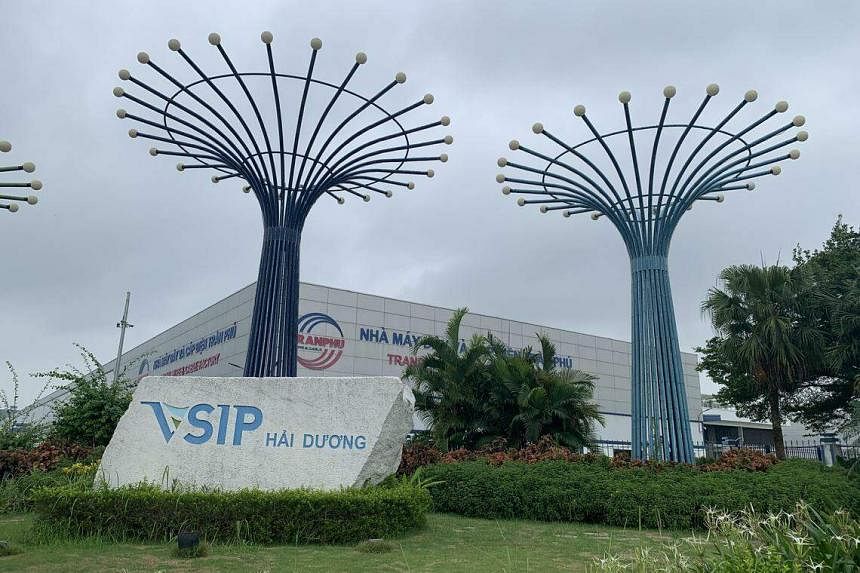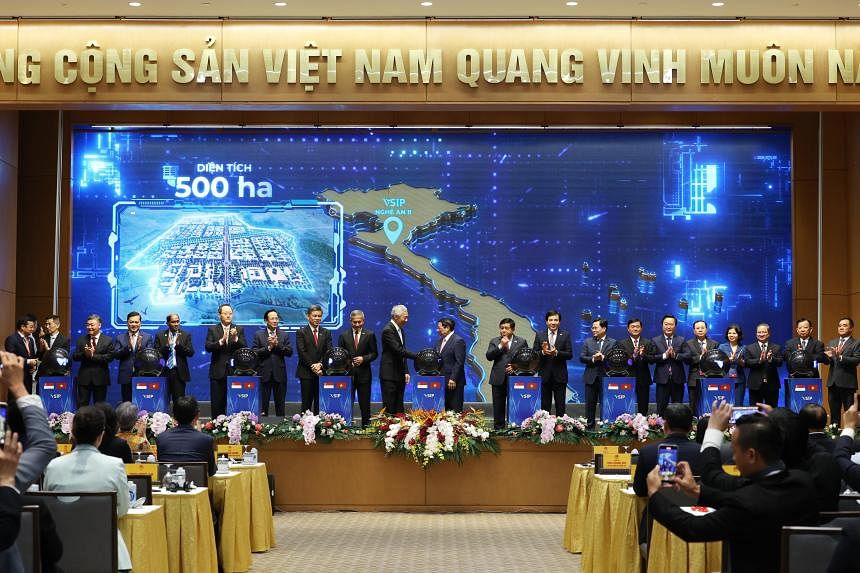HANOI - Companies in Singapore and Vietnam are poised to reap more benefits from a steady increase in the number of Vietnam-Singapore industrial parks (VSIPs), with Sembcorp Development announcing the addition of four new ones to its portfolio.
The wholly owned subsidiary of Singapore-listed energy and urban solutions provider Sembcorp Industries said on Tuesday that this will bring the total number of VSIPs to 17.
Memorandums of understanding for 10 prospective parks were also presented at an event attended by Prime Minister Lee Hsien Loong and his Vietnamese counterpart Pham Minh Chinh in Vietnam’s capital Hanoi.
VSIPs, first set up in 1996, are a key part of Singapore’s economic link with Vietnam.
The existing parks in northern, central and southern Vietnam have attracted more than US$18.4 billion (S$25 billion) in investments and created about 300,000 jobs. They house more than 900 tenants.
In a speech at the event, PM Lee said the VSIP is a story of continuous innovation and progress.
The first VSIP in southern Vietnam’s Binh Duong province focused on light manufacturing, while the second one in the same province featured modern logistics facilities.
“And now, Binh Duong III will be a smart and green industrial park with an on-site solar farm. It will incorporate smart technology across the park’s operations, and meet Singapore’s Green Mark for industrial districts,” said PM Lee, referring to the newest park in the province.
“It is my hope that the VSIP projects continue to contribute and stay relevant to Vietnam’s economic development and its industrial transformation.”
Mr Chinh said he hopes the new VSIPs can be “four in one” – an industrial park, a service centre, residential centre and high-tech centre.
“The Vietnam-Singapore Industrial Park is a model and a symbol for cooperation and economic development between our two countries,” he said.
Giving more details on the four new upcoming VSIPs, Sembcorp said it has received an investment licence to develop the 600ha VSIP Lang Son in northern Vietnam together with its longstanding partner, Vietnam’s state-owned developer Becamex IDC Corp.
The companies also received Mr Chinh’s in-principle approvals to develop new VSIPs in northern Vietnam’s Thai Binh province, Binh Thuan province near Ho Chi Minh City in the south, and Ha Tinh province in north-central Vietnam.
Including these four projects, there will be 17 VSIPs in 13 locations across Vietnam.
Leaders of 10 provinces will also work with Sembcorp and Becamex to jointly engage in feasibility studies for more VSIPs.
The provinces are located throughout the country – Binh Phuoc and Tay Ninh in the south; Khanh Hoa, Thua Thien Hue and Quang Ngai II in central Vietnam; Thanh Hoa in north-central Vietnam; and Nam Dinh, Ninh Binh, Hai Duong II and Hai Phong II in the north.
PM Lee and Mr Chinh also officiated at a virtual ground-breaking ceremony of three VSIPs that were announced in the past, marking the start of land development for handover to customers from 2024.
These projects are VSIP Can Tho in the Mekong Delta, Bac Ninh II in the Red River Delta and Nghe An II on the north-central coast.
Sembcorp Industries group president and chief executive Wong Kim Yin said the plan is for the new generation of VSIPs to be smart and sustainable.
“With the application of new technologies and solutions, we hope to make our industrial parks safer, more reliable and more efficient for tenants and employees, while also supporting our customers’ needs and sustainability targets,” he said at the event.
During a visit by Mr Chinh to Singapore in February, Sembcorp said upcoming VSIPs will be designed to have low carbon footprints and features such as rooftop solar systems and solar farms, where feasible.
They will also use real-time tracking devices to remotely monitor and manage energy, water and waste use, as well as traffic and security.
Sembcorp said on Tuesday that the latest partnerships are not expected to have a material impact on its earnings and net tangible assets per share for the financial year ending Dec 31, 2023.

Mr Kow Juan Tiang, trade agency Enterprise Singapore’s executive director for South-east Asia, said there is strong demand for infrastructure development to support the business needs of companies in Vietnam’s fast-growing manufacturing and industrial sectors.
He told The Straits Times: “As an attractive manufacturing hub in Asia, Vietnam offers competitive operational costs, close proximity to both source markets and demand markets, and well-connected transport routes.
“The country’s continued growth in manufacturing therefore offers good opportunities for Singapore companies to expand into the market to diversify their production base, capture new customers, and lower production costs.”
PM Lee said many Singapore companies are early investors in Vietnam.
He added: “They have ventured into sectors ranging from urban development to logistics to lifestyle and consumer products, and found good partners in Vietnam, just like in the case of Sembcorp and Becamex.
“As Vietnam’s economy moves up the value chain and transitions towards a net-zero future, there is much scope for us to exchange experiences and work together, especially in the emerging areas of the green economy and the digital economy.”


